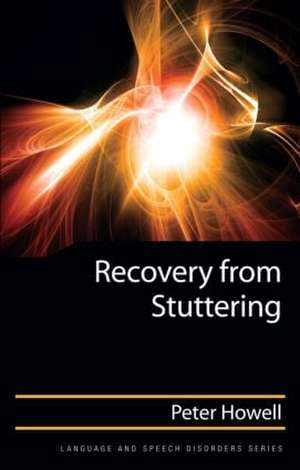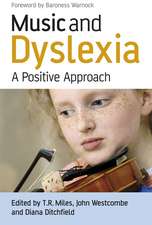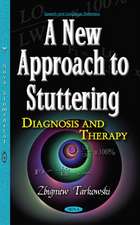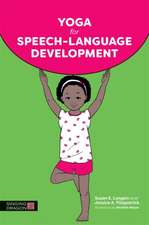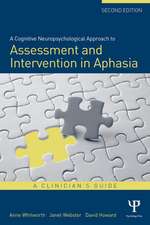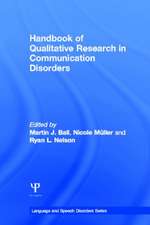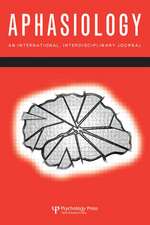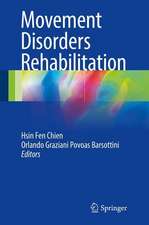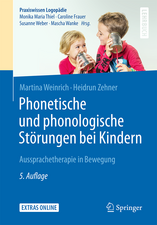Recovery from Stuttering: Language and Speech Disorders
Autor Peter Howellen Limba Engleză Hardback – 9 noi 2010
| Toate formatele și edițiile | Preț | Express |
|---|---|---|
| Paperback (1) | 449.41 lei 6-8 săpt. | |
| Taylor & Francis – 20 ian 2016 | 449.41 lei 6-8 săpt. | |
| Hardback (1) | 767.93 lei 6-8 săpt. | |
| Taylor & Francis – 9 noi 2010 | 767.93 lei 6-8 săpt. |
Din seria Language and Speech Disorders
-
 Preț: 372.24 lei
Preț: 372.24 lei -
 Preț: 449.41 lei
Preț: 449.41 lei - 5%
 Preț: 545.01 lei
Preț: 545.01 lei -
 Preț: 443.65 lei
Preț: 443.65 lei -
 Preț: 320.36 lei
Preț: 320.36 lei -
 Preț: 489.81 lei
Preț: 489.81 lei
Preț: 767.93 lei
Preț vechi: 1029.60 lei
-25% Nou
Puncte Express: 1152
Preț estimativ în valută:
146.97€ • 152.85$ • 122.99£
146.97€ • 152.85$ • 122.99£
Carte tipărită la comandă
Livrare economică 14-28 martie
Preluare comenzi: 021 569.72.76
Specificații
ISBN-13: 9781848729162
ISBN-10: 1848729162
Pagini: 400
Ilustrații: 17 black & white illustrations, 22 black & white tables, 4 black & white halftones, 4 colour illustrations
Dimensiuni: 152 x 229 x 23 mm
Greutate: 0.66 kg
Ediția:1
Editura: Taylor & Francis
Colecția Psychology Press
Seria Language and Speech Disorders
Locul publicării:Oxford, United Kingdom
ISBN-10: 1848729162
Pagini: 400
Ilustrații: 17 black & white illustrations, 22 black & white tables, 4 black & white halftones, 4 colour illustrations
Dimensiuni: 152 x 229 x 23 mm
Greutate: 0.66 kg
Ediția:1
Editura: Taylor & Francis
Colecția Psychology Press
Seria Language and Speech Disorders
Locul publicării:Oxford, United Kingdom
Cuprins
Part 1. General Aspects of Developmental Stuttering. 1. Definitions, Stuttering Severity, and Categorization Instruments. 2. Epidemiology. 3. Symptomatology. Part 2. Factors Related to Developmental Stuttering Based on Experimental Studies. 4. Genetic Factors and Their Impact on Onset and Recovery of Stuttering. 5. CNS Factors in Investigations into Persistent and Recovered Stuttering. 6. Cognitive Factors. 7. Language Factors. 8. Motor Factors. 9. Environmental, Personality, and Emotional Factors. Part 3. Theoretical Frameworks on Developmental Stuttering. 10. Models that Attribute Stuttering to Language Factors Alone. 11. Theories that Explain Why Altered Feedback Improves the Speech Control of Speakers Who Stutter and General Theories of Speech Production that Include Accounts of Stuttering. 12. Model that Proposes an Interaction Between Language and Motor Factors: EXPLAN. Part 4. Practical Issues in Developmental Stuttering. 13. Early Diagnosis of Stuttering and Its Prognosis to Teenage and Beyond. 14. Subtyping. 15. Application to Treatment and General Issues About Recovery.
Recenzii
"Recovery from Stuttering ... is a thorough investigation of all aspects of the disorder, from definition to etiology, predictors, and prevalence. ... Howell's thoughtful and carefully researched book is a fine reference for anyone with an interest in stuttering and recovery from it. It is plainly of importance for theorists, researchers, and practitioners in the area of speech and language disorder; however, it is also of relevance to developmental and educational psychologists. As a model of how to accurately and honestly interpret research findings and carefully critique methodology, Howell's book is a model for all psychologists." - Catherine Scott, Ph.D., Swinburne University of Technology, Australia, in PsycCRITIQUES
"This book’s author does an extremely thorough job of interpreting and evaluating the current evidence about the factors associated with stuttering in its early stages and those which contribute to its recovery … it is clearly laid out with concise introductions and summaries … I would recommend this book to students and any therapist with a special interest in stammering." - Alison Westwood, speech and language therapist, in Speech & Language Therapy in Practice
"This is a book of the highest quality that will appeal to anyone, whether student, clinician, consumer, or other, wanting detailed and up-to-the minute knowledge on development and (particularly) recovery in stuttering. It is superbly written; complex theories and the evidence that underpins them are all laid out clearly and succinctly." - David Ward, University of Reading, UK, in Speaking Out
"Howell gives a good overview of a wide range of subjects. He makes good use of his many experiences by using several different opinions in a balanced way. Concise and understandable, written also for uninformed/inexperienced readers. Highly recommended!" - Paul Eling in Tijdschrift voor Neuropsychologie
"This book is a signal publication on stuttering. Peter Howell has given us a carefully researched and sensitively interpreted analysis of what is known about recovery from stuttering. The author assembles available evidence into logical categories that permit a reasoned and careful examination of factors that contribute to recovery, whether spontaneous or through clinical intervention. A remarkable feature of this book is that it is comprehensive but never cumbersome. The author deftly reviews data and theory in a way that is fluid, focused and fair-minded. Anyone interested in the contemporary understanding of stuttering will benefit from reading this book." - Raymond D. Kent, Professor Emeritus, University of Wisconsin-Madison
"Howell's book is ideally configured as a systematic introduction to the study of stuttering. It begins with fundamental issues in diagnosis and measurement and then advances through a series of chapters devoted to the cognitive, linguistic, neural, genetic, motor, personality, and environmental factors that contribute to varying patterns and severity of stuttering. Upon this basis, Howell then presents and evaluates alternative explanatory theories and suggests methods for diagnosis and treatment. This book presents everything the beginner needs to enter more deeply into the study of stuttering." - Brian MacWhinney, Professor of Psychology, Carnegie Mellon University
"This book’s author does an extremely thorough job of interpreting and evaluating the current evidence about the factors associated with stuttering in its early stages and those which contribute to its recovery … it is clearly laid out with concise introductions and summaries … I would recommend this book to students and any therapist with a special interest in stammering." - Alison Westwood, speech and language therapist, in Speech & Language Therapy in Practice
"This is a book of the highest quality that will appeal to anyone, whether student, clinician, consumer, or other, wanting detailed and up-to-the minute knowledge on development and (particularly) recovery in stuttering. It is superbly written; complex theories and the evidence that underpins them are all laid out clearly and succinctly." - David Ward, University of Reading, UK, in Speaking Out
"Howell gives a good overview of a wide range of subjects. He makes good use of his many experiences by using several different opinions in a balanced way. Concise and understandable, written also for uninformed/inexperienced readers. Highly recommended!" - Paul Eling in Tijdschrift voor Neuropsychologie
"This book is a signal publication on stuttering. Peter Howell has given us a carefully researched and sensitively interpreted analysis of what is known about recovery from stuttering. The author assembles available evidence into logical categories that permit a reasoned and careful examination of factors that contribute to recovery, whether spontaneous or through clinical intervention. A remarkable feature of this book is that it is comprehensive but never cumbersome. The author deftly reviews data and theory in a way that is fluid, focused and fair-minded. Anyone interested in the contemporary understanding of stuttering will benefit from reading this book." - Raymond D. Kent, Professor Emeritus, University of Wisconsin-Madison
"Howell's book is ideally configured as a systematic introduction to the study of stuttering. It begins with fundamental issues in diagnosis and measurement and then advances through a series of chapters devoted to the cognitive, linguistic, neural, genetic, motor, personality, and environmental factors that contribute to varying patterns and severity of stuttering. Upon this basis, Howell then presents and evaluates alternative explanatory theories and suggests methods for diagnosis and treatment. This book presents everything the beginner needs to enter more deeply into the study of stuttering." - Brian MacWhinney, Professor of Psychology, Carnegie Mellon University
Descriere
This book is a comprehensive guide to the evidence, theories, and practical issues associated with recovery from stuttering in early childhood and into adolescence.
